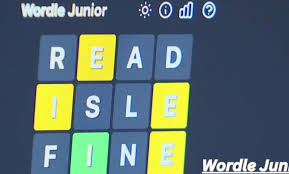Introduction
Word games have become a popular tool for enhancing learning and cognitive skills among children. Among these, Wordle Junior stands out as an engaging and educational twist on the classic word puzzle. This kid-friendly adaptation of the original Wordle game has captured the hearts of young players and their parents alike. With its simple yet challenging gameplay, Wordle Junior not only entertains but also promotes vocabulary development and critical thinking skills in children.
In this article, we will explore what Wordle Junior is all about, the educational benefits it offers, effective tips for playing, and answer some frequently asked questions. By the end, you’ll understand why this game is an excellent addition to your child’s learning toolkit and how it can foster a love for language.
What is Wordle Junior?
Wordle Junior is a simplified version of the original Wordle game, designed specifically for children. While the basic premise remains the same—guessing a hidden five-letter word within six attempts—the rules and gameplay have been tailored to suit younger audiences. Instead of a random selection of complex words, Wordle Junior features vocabulary that is more accessible and age-appropriate, ensuring that children can engage with the game without feeling overwhelmed.
Visually, Wordle Junior is bright and inviting, with themes and graphics that appeal to kids. The colorful interface and playful design create an enjoyable environment for learning. The game is available across various platforms, including web browsers and mobile apps, making it easy for kids to play at home or on the go.
What sets Wordle Junior apart is its focus on fostering a love for words in children. By introducing them to new vocabulary in a fun and interactive manner, the game encourages kids to expand their language skills while enjoying the challenge of guessing words. Whether playing independently or with friends and family, Wordle Junior provides an exciting experience that combines education and entertainment seamlessly.
The Educational Benefits of Playing Wordle Junior
Playing Wordle Junior offers numerous educational benefits that can significantly enhance a child’s learning experience. One of the primary advantages is vocabulary development. As children engage with the game, they encounter new words that they might not come across in their everyday conversations. This exposure helps to broaden their vocabulary and fosters a deeper understanding of language.
Moreover, vocabulary development at a young age is crucial for academic success. Studies show that a robust vocabulary correlates with better reading comprehension and writing skills. Wordle Junior serves as an excellent tool for parents and educators to help children enhance their language skills in a fun and engaging way. By introducing new words through gameplay, kids are more likely to retain them, making it easier for them to apply their knowledge in school and beyond.
In addition to vocabulary enhancement, Wordle Junior promotes critical thinking and problem-solving skills. As players analyze the clues given after each guess, they learn to recognize patterns and make educated guesses based on the feedback received. This process encourages a trial-and-error approach to learning, which is essential for cognitive development. Kids learn that mistakes are part of the journey and that perseverance often leads to success.
Another significant benefit of playing Wordle Junior is the opportunity for social interaction. The game can be played collaboratively with friends and family, promoting teamwork and communication skills. Children learn to discuss their strategies, share ideas, and celebrate successes together, enhancing their interpersonal skills in a fun and relaxed setting. This social aspect of gameplay can also strengthen family bonds, as parents and children come together to enjoy the challenge of Wordle Junior.
Tips and Strategies for Playing Wordle Junior
Getting started with Wordle Junior can be a breeze, but implementing effective strategies can make the experience even more enjoyable and educational. For new players, understanding the rules is key. Each game consists of six attempts to guess a five-letter word, with each guess providing feedback on letter placement. Players should focus on guessing common five-letter words to maximize their chances of success.
One effective strategy is to start with words that contain a mix of vowels and consonants. This approach allows players to gather valuable information about the letters that may or may not be in the target word. For example, guessing a word like “table” can help identify which letters are present, providing clues for subsequent guesses. Players should pay close attention to the feedback received after each guess and use that information to refine their next attempt.
As players become more experienced, they can employ advanced strategies to improve their gameplay. One such tactic is frequency analysis, which involves using knowledge of common letters and letter combinations in the English language. For instance, letters like “E,” “A,” and “R” frequently appear in five-letter words, so including them in early guesses can increase the likelihood of hitting the target word.
Additionally, recognizing common prefixes and suffixes can aid in guessing. Many English words share similar beginnings or endings, which can provide hints about the word’s structure. Engaging in friendly competitions with friends or family members can also add excitement to the game. Setting time limits or themed word lists can create a fun challenge that keeps players motivated and encourages them to think creatively.
Frequently Asked Questions about Wordle Junior
What age group is Wordle Junior suitable for?
Wordle Junior is primarily designed for children aged 5 to 12 years, making it an excellent choice for early learners and elementary school students. The game’s accessible vocabulary and engaging gameplay cater to younger audiences, providing a fun introduction to word puzzles.
Is Wordle Junior available in multiple languages?
Currently, Wordle Junior is primarily available in English. However, variations of the game may exist in other languages, catering to non-English speaking audiences. This aspect can be beneficial for bilingual families looking to enhance their children’s language skills.
Can Wordle Junior be played offline?
Wordle Junior is primarily an online game accessible through web browsers and mobile applications. However, some mobile apps may offer offline modes, allowing kids to play without an internet connection. Parents should check the specific app features to determine offline availability.
Are there any alternatives to Wordle Junior?
Yes, there are several alternatives to Wordle Junior, including similar word-guessing games that cater to various age groups. Some popular options include Hangman, Scrabble Junior, and Boggle. These games also promote language skills while providing different gameplay experiences.
How can parents encourage their kids to play Wordle Junior?
Parents can encourage their children to play Wordle Junior by setting aside time for family game nights, introducing friendly competition, or incorporating the game into educational activities. Discussing the words guessed and their meanings can further enhance the learning experience, making it both fun and educational.
Conclusion
In summary, Wordle Junior is more than just a fun game; it is a valuable educational tool that promotes vocabulary development, critical thinking, and social interaction among children. Its engaging gameplay and kid-friendly design make it an excellent choice for parents looking to enhance their children’s language skills in an enjoyable way. By incorporating strategies and fostering a supportive learning environment, parents can help their children excel in Wordle Junior while nurturing a lifelong love for words. As kids enjoy the challenge of this delightful game, they will also be building essential skills that will benefit them in their academic journey and beyond.



